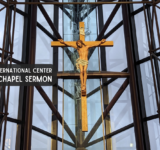In today’s News:
Synod adopts a new budget
In this year like no other, the setting of a budget for FY21 — was reached at last on Sept. 22 when the Lutheran Church — Missouri Synod (LCMS) Board of Directors adopted an operating expenditure resolution of $59.6 million. By contrast, the FY20 budget, after adjustments for big “one-off” events — the Triennial Synod Convention and the LCMS youth gathering — was more than 16 percent higher at $69.3 million. Such a cautious approach to expenditures in FY21 was justified in consideration of major economic uncertainties in the current forecasting environment, not the least of which has been the impact of covid-19.
Appeal for Nativity scene
Liberty Counsel filed its reply brief to the Seventh Circuit Court of Appeals refuting the opinion by an Indiana federal judge who ruled against the Nativity scene display at the Jackson County Courthouse. Liberty Counsel represents Jackson County and oral argument is scheduled for Nov. 12. In addition to the Nativity scene, the annual holiday display also includes a large lighted Santa Claus, sleigh with reindeer and a group of Christmas carolers. The courthouse grounds are also decorated with many kinds of lights and other non-religious symbols of the holiday season. Judge Tanya Pratt previously ruled in favor of a plaintiff who does not live or work in the county and does not transact any business in the Jackson County Courthouse. This building no longer hosts court proceedings as they are now conducted in the new courthouse. The U.S. Supreme Court and numerous federal appeals courts have recognized that government entities may recognize Christmas as a holiday and may maintain Christmas displays that include both religious and secular symbols.
Seminaries may enforce religious belief on students
In a landmark decision with nationwide impact, a federal judge ruled that a seminary has the right to train students for ministry according to its sincere religious beliefs, free from government entanglement. Wednesday, in Maxon v. Fuller Theological Seminary, the Central District of California blocked claims by two individuals who sued Fuller Theological Seminary, arguing that federal law made it illegal for the seminary to dismiss them from its school of theology for violating its religious standards. Becket Law is defending the seminary, arguing that the government cannot control how religious schools train future ministers and other religious leaders. When students apply to Fuller Theological Seminary, they agree to faithfully follow the seminary’s religious standards throughout their training for ministry and other religious service. Like all their peers, the plaintiffs made that agreement. But after the seminary learned that the plaintiffs had violated the standards, the seminary dismissed them and refunded their costs for the classes they were unable to complete. The plaintiffs then sued. The judge dismissed the plaintiffs’ lawsuit, explaining: “It is well established . . . That courts should refrain from trolling through a person’s or institutions religious beliefs.”







